Artificial Intelligence in Focus: A Comparative Analysis of the BRICS and FOC Declarations on AI Governance
The BRICS Leaders' Declaration on Global Governance of Artificial Intelligence has gained prominence in both Brazilian and international media, as it represents a joint position by Global South countries in the ongoing contest over this emerging technology.
By Carla Rodrigues, Jaqueline Pigatto, and Natasha Nóvoa
The BRICS Leaders’ Declaration on Global Governance of Artificial Intelligence has gained prominence in both Brazilian and international media, as it represents a joint position by Global South countries in the ongoing contest over this emerging technology. Launched in June 2025, during Brazil’s presidency of the bloc, BRICS now includes more participating countries, reaching a consensus among Brazil, Russia, India, China, South Africa, Saudi Arabia, Egypt, the United Arab Emirates, Ethiopia, Indonesia, and Iran.
In the same month, the Freedom Online Coalition (FOC) — a group comprising 42 developed and developing countries, led by the Netherlands, Germany, France, the United Kingdom, and the United States — also released a declaration on Artificial Intelligence. The groups have no common membership, and while the BRICS constitute a multilateral effort from the Global South to address a wide range of international cooperation issues, the FOC focuses on issues related to rights and freedoms on the Internet, with a focus on freedom of expression and freedom of association.
Though both emphasize the importance of global AI governance within the United Nations (UN), they present different priorities and approaches, some more specific than others, across various topics. The most notable difference lies in the FOC’s defense of multistakeholderism. While both groups are intergovernmental, the FOC actively promotes civil society participation in AI debates, something Brazil sought to address during its BRICS presidency this year. This divergence is also reflected in the central role that human rights play in the FOC declaration, while BRICS prioritizes digital sovereignty and the political and economic empowerment of its member states.
The FOC not only references human rights but also identifies key tools for AI governance, such as risk assessments and due diligence. It also cites the UN Guiding Principles on Business and Human Rights, a document that provides guidelines for the private sector regarding activities that directly impact human rights. While the FOC is more focused on coordination within the UN system and alignment with the Sustainable Development Goals (SDGs), BRICS, though centered on the UN, does not specify how such work should be operationalized. This may stem from the FOC’s narrower digital focus, in contrast to the broader thematic scope of BRICS.
BRICS articulates wide-ranging economic and political goals and, in its Declaration, expresses concern over the development of Artificial General Intelligence (AGI). The group advocates for governance, policy, and AI research to be equitably and multipolarly distributed, emphasizing the leadership of Global South countries. The BRICS Declaration assumes a significant role in challenging the current global digital order, characterized by the concentration of power of big tech, aiming to reduce barriers to the development of AI-based technologies by countries of the Global South and reflecting the joint commitment of its members to strengthen economic, political and social cooperation among themselves.
Another point worth highlighting is the difference in tone adopted in combating disinformation. The BRICS countries demonstrated a more proactive stance on the part of public institutions regarding monitoring, correcting, and guiding the generation of potentially disinformative content from the perspective of information integrity and the promotion of digital literacy, while the FOC adopted a stance focused on freedom of expression, a central theme since the publication of the document “Joint Action for Free Expression on the Internet”, and the commitment to “share information among States on potential violations and other measures that undermine the enjoyment of freedom of expression and other human rights on the Internet.” Furthermore, regarding the most vulnerable groups affected by AI, the BRICS countries include women, minorities, people with disabilities, children, youth, and the elderly, while the FOC emphasizes gender-based violence as the main target of discriminatory biases in AI.
Despite the distinctions, one consensus is clear: a collective global effort is needed to establish minimum standards for AI governance and development. The difference, however, lies in the form and manner in which these objectives are operationalized. The BRICS undeniably prioritize development and the reduction of inequalities that permeate the Global South, while the FOC bases its actions on defending freedom of expression and human rights, adopting a more open approach from a geopolitical perspective and embracing the participation of society as a whole.
Civil society participation is explicitly highlighted in the FOC declaration, which names the Internet Governance Forum (IGF) and the International Telecommunication Union’s AI for Good as appropriate venues for AI debates. It also calls for the inclusion of the UN Office of the High Commissioner for Human Rights (OHCHR) in the AI Panel and Global Dialogue, two AI initiatives from the UN system derived from the Global Digital Compact. Negotiations to establish these two new spaces are currently underway at the UN headquarters in New York.
There is strong demand, particularly from Global South states, for intergovernmental deliberative spaces with equal participation. At the same time, civil society, academia, the technical community, and the private sector advocate for multistakeholder participation, ensuring that non-state actors also have a voice in shaping AI policies and safeguards. However, it remains unclear how these two new spaces will be coordinated, or how they will connect with existing UN platforms like the IGF and AI for Good, which are not deliberative bodies but do offer inclusive participation to state and non-state actors alike.
On the other hand, Global South actors, both state and non-state, raise a concern: the multiplicity of forums and processes makes in-person participation difficult due to high travel costs and barriers such as visa and migration policies. Although many meetings are hybrid, the most consequential diplomatic conversations often happen informally, “in the corridors” of major events, making it difficult for under-resourced actors to access these critical spaces. The FOC agreement to encourage dialogue between governments and organized civil society is important and can serve as an example for BRICS.
This leads to a key challenge: how can the divergence between intergovernmentalism and multistakeholderism be reconciled to make AI governance democratic, equitable, and effective in practice? This is undoubtedly one of the most pressing social, economic, and political questions today. Thus, beyond the areas of consensus, it is essential to understand the divergences shaping the debate, in order to build an alternative, collaborative path for regulating and governing AI in the global context.
Veja também
-
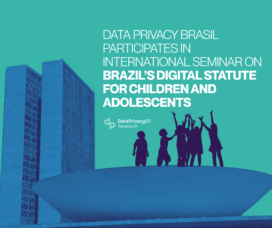
Data Privacy Brasil participates in international seminar on Brazil’s Digital Statute for Children and Adolescents
Yesterday, Data Privacy Brasil took part in the seminar “Online Safety for Children Statute: Lessons from the Brazilian Experience”, organized by Digital Action and Conectas Human Rights. Check out our report featuring the key highlights from the event.
-

Brazilian Senate approves Landmark Digital Child Protection Bill: what are the next steps?
On 27 August 2025, Brazil's Senate approved Bill PL 2628/2022, focused on protecting the rights of children in digital platforms. What happens now?
-

AI Explainability: How to Avoid Rubber-Stamping Recommendations
Experts debate if human oversight can replace the need for the explainability of AI systems. Bruno Bioni, co-director of Data Privacy Brasil, was one of the experts interviewed. Check it out in the text!
-

Digital Merger Watch: Data Privacy Brasil joins new global initiative
The group includes national and international organizations and will focus on analyzing and challenging Big Tech’s efforts to reinforce its dominance through mergers and acquisitions.
-
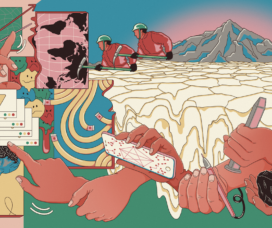
Beyond Digital Rights: Towards a Fair Information Ecosystem?
One of the major challenges in the field of digital rights is the tendency toward segmentation and hyper-specialization in topics such as privacy, freedom of expression, net neutrality, data protection, and the regulation of AI systems. Learn more about the topic in the article published in Tech Policy.
-
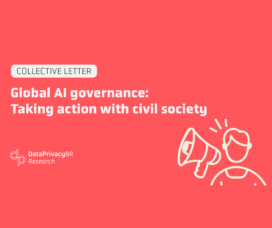
Global AI governance: Taking action with civil society
More than 40 civil society organizations call for inclusion in AI Action Summit in letter on global governance of Artificial Intelligence.
-
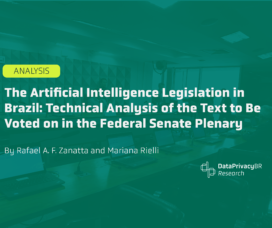
The Artificial Intelligence Legislation in Brazil: Technical Analysis of the Text to Be Voted on in the Federal Senate Plenary
The Internal Temporary Artificial Intelligence Committee (CTIA) of the Federal Senate approved the substitute report for Bill 2338/2023. This bill aims to define the legal framework for regulating the use of Artificial Intelligence systems in Brazil.
Veja Também
-

Data Privacy Brasil participates in international seminar on Brazil’s Digital Statute for Children and Adolescents
Yesterday, Data Privacy Brasil took part in the seminar “Online Safety for Children Statute: Lessons from the Brazilian Experience”, organized by Digital Action and Conectas Human Rights. Check out our report featuring the key highlights from the event.
-

AI Explainability: How to Avoid Rubber-Stamping Recommendations
Experts debate if human oversight can replace the need for the explainability of AI systems. Bruno Bioni, co-director of Data Privacy Brasil, was one of the experts interviewed. Check it out in the text!
-

Digital Merger Watch: Data Privacy Brasil joins new global initiative
The group includes national and international organizations and will focus on analyzing and challenging Big Tech’s efforts to reinforce its dominance through mergers and acquisitions.
-

Beyond Digital Rights: Towards a Fair Information Ecosystem?
One of the major challenges in the field of digital rights is the tendency toward segmentation and hyper-specialization in topics such as privacy, freedom of expression, net neutrality, data protection, and the regulation of AI systems. Learn more about the topic in the article published in Tech Policy.
-

Global AI governance: Taking action with civil society
More than 40 civil society organizations call for inclusion in AI Action Summit in letter on global governance of Artificial Intelligence.
-

The Artificial Intelligence Legislation in Brazil: Technical Analysis of the Text to Be Voted on in the Federal Senate Plenary
The Internal Temporary Artificial Intelligence Committee (CTIA) of the Federal Senate approved the substitute report for Bill 2338/2023. This bill aims to define the legal framework for regulating the use of Artificial Intelligence systems in Brazil.
-
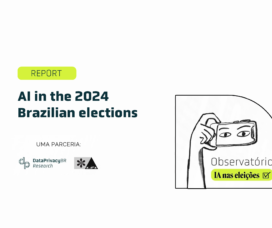
AI in the 2024 Brazilian elections
Aláfia Lab, *desinformante and Data Privacy Brasil launch the report “AI in the 2024 Brazilian elections”, with an analysis of the use of artificial intelligence in the first round of the elections.
-

A Fragmented Landscape Is No Excuse for Global Companies Serious About Responsible AI
For the third year in a row, MIT Sloan Management Review and Boston Consulting Group (BCG) have brought together an international panel of AI experts to help gain insights into the lack of alignment around global standards and norms for responsible AI. Bruno Bioni, co-director of Data Privacy Brasil, was one of the experts interviewed. Check it out in the text!
-

Research Project Outcomes: A vision for inclusive educational technology
Check out Júlia Mendonça's interview for Tech Ethics Lab, about the use of technology in schools.
-
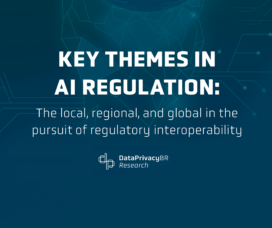
Key Themes in AI Regulation: The local, regional, and global in the pursuit of regulatory interoperability
Data Privacy Brasil releases its report “KeyThemes in AI Regulation: The local, regional, and global in the pursuit of regulatory interoperability,” supported by the Heinrich Böll Foundation. This work is the result of months of research under the project “Where the SabIA Sings: Governance and Regulation of Artificial Intelligence from Brazil”.
-
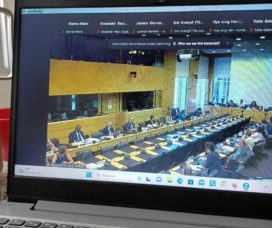
Data Privacy Brasil participates in UN’s OHCHR briefing on Brazil
The organization highlighted how the advance of edtech has been violating children’s privacy in the country
DataPrivacyBr Research | Content under licensing CC BY-SA 4.0

